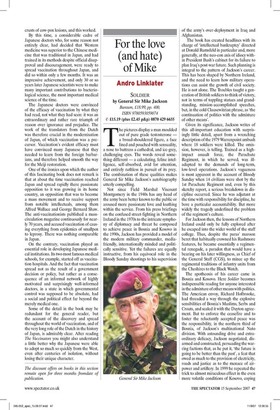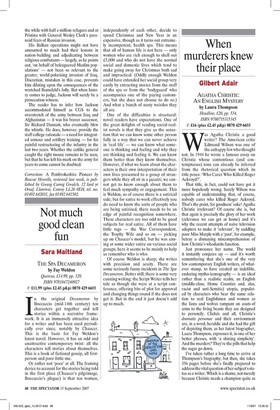For the love (and hate) of Mike
Andro Linklater SOLDIER by General Sir Mike Jackson Bantam, £18.99, pp. 400, ISBN 9780593059074 £15.19 (plus £2.45 p&p) 0870 429 6655 The pictures display a man moulded out of pure grade testosterone — a broad-shouldered figure, a face lined and pouched with sensuality, a nose to buttress a cathedral, and ice-grey, challenging eyes. The words reveal something different — a calculating, feline intelligence, self-absorbed, avid for attention, and entirely ruthless in pursuit of its prey. The combination of these qualities makes General Sir Mike Jackson's autobiography utterly compelling.
Not since Field Marshal Viscount Montgomery in the 1940s has any head of the army been better known to the public or aroused more passionate love and loathing within the service. From his press briefings on the confused street-fighting in Northern Ireland in the 1970s to the intricate symphony of diplomacy and threat he composed to achieve peace in Bosnia and Kosovo in the 1990s, Jackson has provided a model of the modern military commander, mediafriendly, internationally minded and politically sensitive. Yet the failures are equally instructive, from his equivocal role in the Bloody Sunday shootings to his supervision of the army's over-deployment in Iraq and Afghanistan.
The book has created headlines with its charge of 'intellectual bankruptcy' directed at Donald Rumsfeld in particular and, more generally, at the neo-con axis of idiocy within President Bush's cabinet for its failure to plan Iraq's post-war future. Such planning is integral to the pattern of Jackson's career. This has been shaped by Northern Ireland, and the need to learn how military operations can assist the growth of civil society. He is not alone. The Troubles taught a generation of British soldiers to think of victory, not in terms of toppling statues and grandstanding, mission-accomplished speeches, but, in the cold Clausewitzian phrase, as `the continuation of politics with the admixture of other means'.
Given its significance, Jackson writes of this all-important education with surprisingly little detail, apart from a wrenching description of the 1979 Warrenpoint ambush where 18 soldiers were killed. The omission, however, is telling. Trained as a highimpact assault force, the Parachute Regiment, in which he served, was illadapted to the demands of long-term, low-level operations. Jackson's vagueness is most apparent in the account of Bloody Sunday when 14 civilians were shot by the 1st Parachute Regiment and, even by this sketchy report, a serious breakdown in discipline occurred. Since he was adjutant at the time with responsibility for discipline, he bore a particular accountability. But more widely the tragedy underlined the problem of the regiment's culture.
For Jackson then, the lessons of Northern Ireland could only be fully explored after he escaped into the wider world of the staff college. Thus, despite the paras' maroon beret that habitually crowned his Rushmore features, he became essentially a regimental renegade, a paradox that would have a bearing on his later willingness, as Chief of the General Staff (CGS), to mince up the regimental traditions of infantry units from the Cheshires to the Black Watch.
The apotheosis of his career came in Bosnia and Kosovo. Here Soldier becomes indispensable reading for anyone interested in the admixture of other means with politics. The American envoy, Richard Holbrooke, had threaded a way through the explosive sensibilities of Bosnia's Muslims, Serbs and Croats, and sealed it with the Dayton agreement. But to enforce the ceasefire and to foster the reluctantly accepted peace was the responsibility, in the northern third of Bosnia, of Jackson's multinational Nato division. With astounding drive and extraordinary delicacy, Jackson negotiated, disarmed and constructed, persuading the warring factions that, as he put it, 'the future is going to be better than the past', a feat that owed as much to the provision of electricity, roads and justice as to the menace of airpower and artillery. In 1999 he repeated the trick to almost miraculous effect in the even more volatile conditions of Kosovo, coping the while with half a million refugees and at Pristina with General Wesley Clark's paranoid fears of Russian invasion.
His Balkan operations might not have amounted to much had their lessons in nation-building and adjudicating between religious combatants — largely, as he points out, 'on behalf of beleaguered Muslim populations' — not been so relevant to the greater, world-polarising invasion of Iraq. Discretion, mistaken in this case, prevents him dilating upon the consequences of the wretched Rumsfeld's folly. But when history comes to judge, Jackson will surely be a prosecution witness.
The reader has to infer how Jackson accommodated himself as CGS to the overstretch of the army between Iraq and Afghanistan — it was his braver successor, Sir Richard Dannatt, who eventually blew the whistle. He does, however, provide the staff college rationale — a need for integrated armour and artillery training — for his painful restructuring of the infantry in the last two years. Whether the catlike general caught the right mouse remains to be seen, but that he has left his mark on the army for years to come cannot be doubted.
Correction: A Pembrokeshire Pioneer by Roscoe Howells, reviewed last week, is published by Gwasg Can-eg Gwalch, 12 _lard yr Orsaf, Llanrwst, Conwy LL26 OEH, teL no. 01492 642031, fax 01492 641502.


























































 Previous page
Previous page